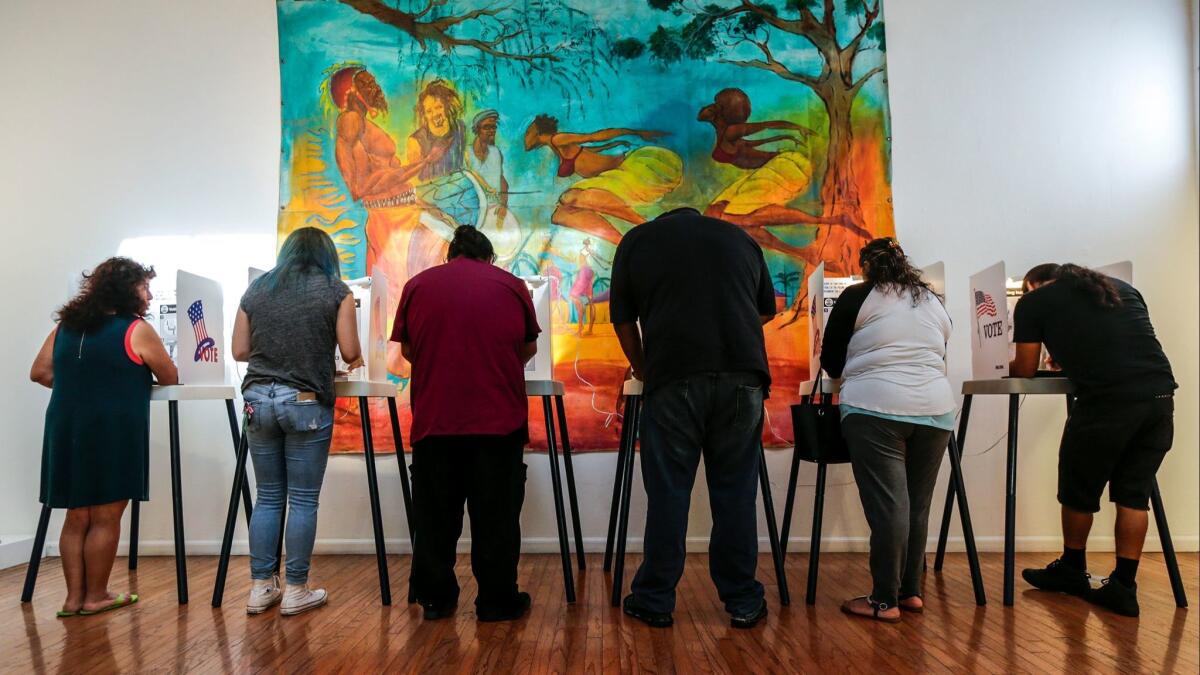Registered ‘independents’ may soon outnumber Republicans on California’s voter rolls

Reporting from Sacramento — As the June 5 primary election approaches, Democrats still dominate California’s voting rolls and the percentage of “independent” voters continues to rise, according to new figures provided by the secretary of state’s office.
Just shy of a quarter of the state’s voters now forgo any party label, registering as “no party preference,” a slight increase from last year. If the trend continues, as expected, California’s pool of independent voters could soon surpass the number of Republicans in the state.
Democrats account for 45% of California’s registered voters, giving the party a 19 percentage point advantage over the GOP, the state registration figures show.
The Democratic Party’s slice of the electorate in non-presidential election cycles has remained relatively stagnant for two decades, while the Republican Party’s registration slipped by 10 percentage points.
The percentage of independents, meanwhile, has more than doubled since 1997.
Paul Mitchell, who runs the data firm Political Data Inc., said California could have more independent voters than Republicans by the November general election.
Voter registration trends for Democrats, while better, are not exactly rosy. Mitchell said more and more millennials, college students, young Latinos and Asian Americans are registering as independents.
“Democrats are celebrating Republicans losing registration. But they should be mourning,” Mitchell said. “This new registrant population looks like Democrats but they are registering as independents.”
However, in past elections, “no party preference” voters in California have leaned heavily Democratic at the polls.
Democrats continue to hold a firm grasp on most of Southern California, though the region has a fair number of Republican pockets.
Democrats dominate the electorate in Los Angeles County — home to 1 out of 5 voters in the state — and hold majorities in Riverside, San Bernardino, San Diego, Imperial and Ventura counties.
Republicans hold only Orange County, home to four Republican-held congressional districts won by Hillary Clinton in the 2016 election. Democrats hope to wrest most of them from GOP control, a pivotal piece of the party’s strategy to win back control of the House in November.
Republicans have a 3-percentage-point advantage over the Democrats in Orange County. Ten years ago, the GOP had a 10-percentage-point advantage.
Statewide, just under 19 million Californians were registered to vote in January — 76% of those who are eligible.
Here’s how they break down by party:
Democratic Party: 44.63%
Republican Party: 25.44%
No party preference: 24.95%
American Independent Party: 2.66%
Libertarian Party: 0.74%
Green Party: 0.48%
Peace and Freedom Party: 0.40%
Mitchell noted that many people who intend to register as independents mistakenly sign up with the American Independent Party instead of registering as “no party preference.”
A Times investigation in 2016 found widespread confusion among California voters who choose the American Independent Party, an ultra-conservative organization. A poll of AIP voters at the time found 73% mistakenly thought they had registered as “independent” of all parties. Those voters should have chosen the “no party preference” option.
Since the Times investigation was published, the percentage of Californians registered with the American Independent Party has declined from 2.75% in April 2016 to 2.66% in January. But the actual number of voters in the party has increased from 474,338 to 503,955.
“Fundamentally, the party name needs to be changed because voters are confused,” Mitchell said.
Twitter: @philwillon
Updates on California politics
UPDATES:
3:35 p.m.: This story was updated with details about registration in Southern California and information about registration in the American Independent Party.
This story was originally published at 1:55 p.m.
More to Read
Get the L.A. Times Politics newsletter
Deeply reported insights into legislation, politics and policy from Sacramento, Washington and beyond. In your inbox three times per week.
You may occasionally receive promotional content from the Los Angeles Times.











